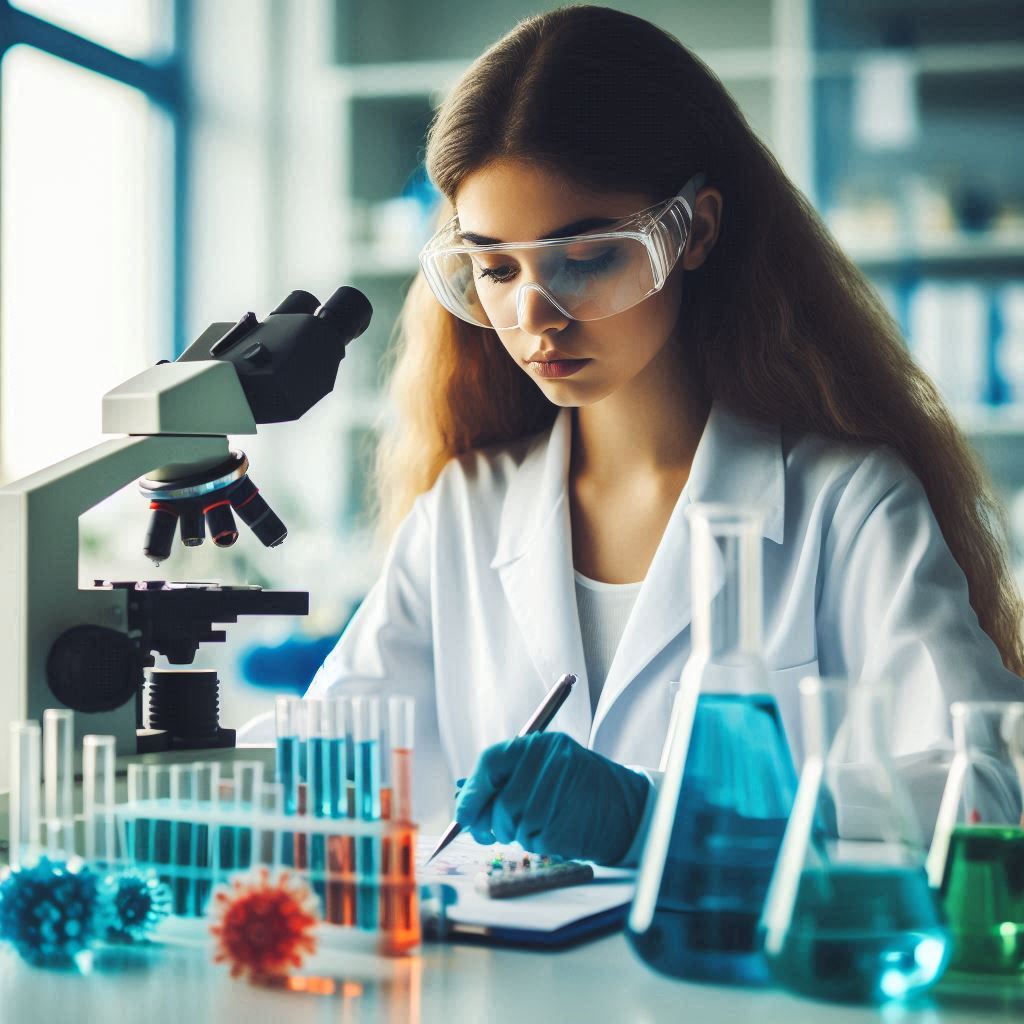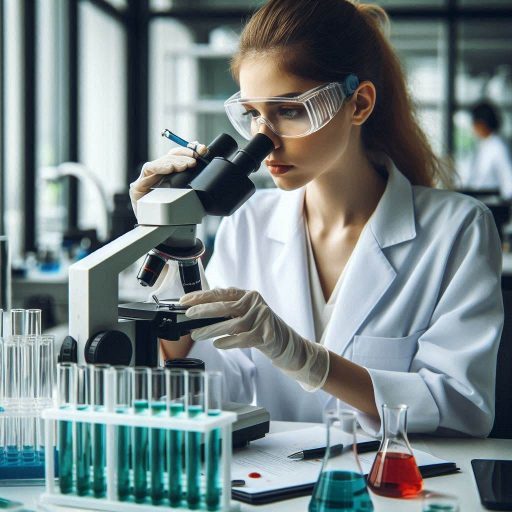Introduction
Virologist Contribution to Vaccine Development, their structures, and how they cause diseases.
Their work is essential in understanding how viruses spread, mutate, and affect living organisms.
This knowledge is crucial in developing effective vaccines to combat viral infections.
In vaccine development, virologists play a key role by identifying viral strains, understanding how they interact with the immune system, and testing how the body responds to potential vaccines.
They conduct research to determine which parts of the virus are most effective for triggering an immune response.
Virologists also evaluate vaccine candidates in preclinical and clinical trials, ensuring that they are safe and effective.
Virologists help identify new viral threats, which is critical for developing vaccines quickly during outbreaks.
For example, their work was pivotal in the rapid development of COVID-19 vaccines.
Without the foundational research conducted by virologists, creating effective vaccines would be significantly more challenging.
The contributions of virologists to vaccine development are vital for preventing the spread of diseases and protecting public health.
Their research ensures that vaccines are not only safe but also capable of controlling and eliminating viral infections.
Virologist’s role in understanding viruses
Research on Different Viruses and Their Structures
Virologists play a crucial role in vaccine development by researching different viruses and their structures.
Understanding the structure of viruses allows virologists to identify potential vaccine targets.
By analyzing the proteins and genetic material of viruses, they determine which parts can trigger an immune response.
The structure of a virus includes the outer proteins, which are often used to infect host cells.
Virologists focus on these proteins to develop vaccines that block the virus from entering cells.
They use techniques like cryo-electron microscopy to visualize the virus at a molecular level.
Virologists also study the genetic makeup of viruses.
Genetic analysis helps identify mutations that may affect a virus‘s ability to infect or evade the immune system.
This knowledge is critical in designing vaccines that can adapt to evolving viruses.
For example, virologists studying the influenza virus analyze its constantly changing structure.
They track how its surface proteins mutate over time to stay ahead of vaccine-resistant strains.
This research is vital for creating annual flu vaccines that are effective against current strains.
Virologists have also contributed to the development of vaccines for complex viruses like HIV and coronaviruses.
By studying their unique structures, they develop strategies to prevent infection and enhance immune responses.
Their work is key to controlling viral diseases through targeted vaccine design.
Studying How Viruses Interact with Hosts
Another important contribution of virologists to vaccine development is studying how viruses interact with hosts.
Understanding the interaction between a virus and the human immune system is essential for designing effective vaccines.
Virologists investigate how viruses enter cells, replicate, and evade immune defenses.
Virologists examine the immune response generated by a viral infection.
They identify which immune cells are activated and which viral components trigger the strongest response.
This research helps develop vaccines that mimic a natural infection, stimulating the immune system without causing illness.
A major focus for virologists is understanding viral evasion tactics.
Some viruses, like HIV, can hide from the immune system, making it difficult to create lasting immunity.
Virologists research how these viruses avoid detection and work on strategies to overcome these defenses through vaccine design.
For example, virologists studying SARS-CoV-2, the virus that causes COVID-19, discovered how it binds to receptors in human cells.
This knowledge helped in developing vaccines that prevent the virus from attaching to and infecting cells.
Understanding this interaction was critical in creating effective vaccines like those based on mRNA technology.
Virologists also study how the immune system can overreact to viruses, leading to complications like inflammation.
They use this knowledge to design vaccines that prevent excessive immune responses while still providing protection.
Read: Women in Botany: Celebrating Pioneers and Leaders
Virologist’s contribution to vaccine design
Developing Vaccines Based on Virus Characteristics
Virologists play a crucial role in vaccine development by studying the unique characteristics of viruses.
Understanding the virus‘s structure, lifecycle, and modes of transmission allows them to target key viral components.
These insights are critical in designing vaccines that can effectively stimulate the immune system to recognize and fight the virus.
Virologists analyze viral proteins and genetic material to identify potential vaccine targets.
For example, the spike protein on the surface of coronaviruses became the focus for COVID-19 vaccine development.
By pinpointing these specific viral features, virologists can create vaccines that prompt the body‘s immune response without causing illness.
Through laboratory experiments, virologists test how the immune system reacts to different viral components.
This process helps them understand which viral antigens provoke the strongest immune response.
Based on these findings, virologists can design vaccines that offer the best protection against infection.
Creating Effective and Safe Vaccines to Prevent Viral Infections
Virologists are responsible for ensuring vaccines are not only effective but also safe.
Developing a safe vaccine requires rigorous testing through multiple stages.
After identifying viral targets, virologists work on formulating vaccine candidates that can be tested in preclinical trials.
These initial tests evaluate how well the vaccine works and whether it causes any harmful side effects.
Once a vaccine candidate shows promise, virologists conduct clinical trials in humans.
These trials are divided into phases, each focusing on specific aspects of vaccine safety and efficacy.
Virologists oversee these trials, analyzing data to ensure the vaccine generates a strong immune response and does not cause adverse reactions.
Virologists also contribute to refining vaccine production methods.
They work on improving vaccine stability, ensuring that vaccines can be produced at scale, stored properly, and distributed globally.
This is essential for reaching populations in need, especially during outbreaks or pandemics.
Virologists further assess how long vaccine-induced immunity lasts and whether booster shots are needed.
Their ongoing research ensures that vaccines remain effective over time, even as viruses mutate and evolve.
This work is particularly relevant for viruses like influenza, which require regular updates to the vaccine formula.
Addressing Emerging Viral Threats
Virologists are often on the front lines when new viral threats emerge.
During outbreaks, virologists race against time to develop vaccines that can control the spread of the virus.
Their ability to quickly analyze the viral genome and identify key features accelerates the vaccine development process.
This expertise was vital in creating vaccines for emerging threats like Ebola and Zika.
For instance, the rapid development of COVID-19 vaccines was made possible through decades of virology research on coronaviruses.
Virologists had already studied the virus family and were able to apply this knowledge to create vaccines at unprecedented speed.
Their contribution not only helped control the pandemic but also demonstrated the importance of ongoing viral research.
Virologists play an essential role in developing vaccines by studying viruses and designing effective, safe solutions to prevent infections.
Their expertise in understanding virus characteristics allows them to identify the best vaccine targets.
Through rigorous testing and clinical trials, virologists ensure vaccines are both safe and effective.
Their work remains vital in combating existing viral diseases and addressing emerging threats.
Through their efforts, virologists contribute significantly to global public health, helping to protect millions of people from viral infections.
Read: How Climate Change Is Impacting Plant Research
Virologist’s involvement in clinical trials
Testing Vaccines in Controlled Settings
Virologists play a critical role in testing vaccines in controlled settings.
They design and conduct preclinical and clinical trials to evaluate vaccine safety and efficacy.
In the early stages, virologists test potential vaccines on cell cultures and animal models to assess their ability to provoke an immune response.
These trials help identify promising vaccine candidates before they are tested in humans.
By conducting trials in controlled environments, virologists ensure that all variables are closely monitored.
They carefully track how the vaccine interacts with the immune system and study its ability to prevent infection.
This data is essential for determining whether a vaccine can move forward to human trials.
Virologists also ensure that the conditions in controlled settings mimic real-world situations as closely as possible.
This allows them to gather reliable data about how well the vaccine will work in diverse populations.
By maintaining control over the testing environment, virologists can limit external factors that might interfere with the results.
Another key aspect of vaccine testing is monitoring for side effects.
Virologists assess the short-term and long-term impacts of vaccine exposure in test subjects.
Their findings help identify any potential safety concerns that could arise once the vaccine is widely distributed.
Through rigorous testing, virologists help ensure that only the most effective and safest vaccines proceed to human trials.
Their expertise is critical in making sure vaccines meet the highest standards of safety and efficacy before they are released to the public.
Ensuring Vaccines Are Safe and Effective for Human Use
Virologists are essential in ensuring vaccines are safe and effective for human use.
Once a vaccine has passed preclinical trials, virologists oversee clinical trials involving human participants.
These trials are conducted in phases, starting with small groups and eventually expanding to include thousands of volunteers.
During clinical trials, virologists monitor participants to determine how the vaccine interacts with the human immune system.
They assess its ability to generate antibodies and protect against viral infections.
Virologists also measure how long the vaccine‘s protection lasts and whether booster shots are necessary.
Safety is always a top priority during these trials.
Virologists carefully watch for any adverse reactions or side effects.
They analyze the frequency and severity of these effects to ensure the vaccine does not pose significant risks.
The data collected during clinical trials helps virologists determine the appropriate dosage and vaccination schedule for different age groups.
Virologists also ensure that vaccines are effective across diverse populations.
Clinical trials are conducted on individuals from various demographics to assess the vaccine‘s performance in different ethnicities, ages, and health conditions.
This step ensures the vaccine is broadly effective, reducing health disparities in immunization.
After clinical trials, virologists review all the data to ensure that the vaccine meets regulatory standards for safety and efficacy.
Read: Exploring the Different Branches of Geology
Virologist’s collaboration with other scientists
Working with Immunologists and Microbiologists
Virologists play a critical role in vaccine development, working closely with immunologists and microbiologists to understand viral behavior.
Their expertise in viral structure and replication informs vaccine strategies that target specific viral weaknesses.
Immunologists focus on how the body‘s immune system responds to viral infections.
Virologists collaborate with them to study how viruses interact with the immune system.
This collaboration helps researchers design vaccines that trigger a strong immune response.
Microbiologists provide additional insights by studying microorganisms, including bacteria that may interact with viruses.
This interdisciplinary approach ensures that vaccines are designed with a comprehensive understanding of how viruses function in various biological environments.
By collaborating, these experts can assess the effectiveness of potential vaccine candidates more rapidly.
Their collective knowledge speeds up the discovery of viable solutions.
Virologists provide essential data on virus mutations and how they may affect vaccine efficacy over time.
Virologists also study the life cycles of viruses, allowing them to pinpoint crucial moments where a vaccine can block infection.
This information is shared with immunologists, who then determine how to stimulate the immune system to respond effectively at those points.
Sharing Knowledge and Resources to Accelerate Vaccine Development
In addition to working with other scientists, virologists share their findings and resources to accelerate vaccine development.
Open communication between research teams ensures that discoveries are quickly translated into real-world applications.
Virologists often share viral samples and data with global research communities.
This exchange of information is vital for understanding how different viral strains behave in various environments.
Collaboration on a global scale allows researchers to develop vaccines that are effective across diverse populations.
Access to shared databases and research publications speeds up the vaccine development process.
Virologists contribute their research on viral genomics, helping identify viral mutations that may impact vaccine design.
Sharing this data helps other researchers focus on developing vaccines that can target the most harmful strains.
Research institutions and government agencies also collaborate with virologists to fund and facilitate large-scale vaccine studies.
Sharing funding resources and research facilities allows for broader testing and refinement of potential vaccines.
This cooperation leads to faster clinical trials and results.
Virologists often participate in international consortiums that prioritize vaccine development for emerging viral threats.
These efforts pool global resources to address public health crises swiftly.
By combining resources and expertise, virologists help overcome bottlenecks in research and production timelines.
The COVID-19 pandemic highlighted the importance of collaboration in vaccine development.
Virologists across the globe worked together, sharing insights into the virus‘s structure and mutations.
This collaboration paved the way for the rapid development of vaccines that have saved millions of lives.
Virologists are central to the vaccine development process, working closely with immunologists and microbiologists to design effective solutions.
Their collaboration leads to a deeper understanding of how viruses interact with the immune system.
By sharing knowledge and resources, virologists accelerate vaccine development, ensuring timely responses to emerging viral threats.
Read: Top Skills Needed for a Successful Geology Career

Virologist’s role in vaccine production
Overseeing the Vaccine Manufacturing Process
Virologists play a vital role in the development and manufacturing of vaccines.
Their expertise ensures that vaccines are designed to effectively target specific viruses.
Once the initial research and trials are completed, virologists oversee the entire vaccine production process.
During manufacturing, virologists ensure that the virus strain used in the vaccine is properly cultivated.
They monitor each step to guarantee that the virus behaves as expected, allowing it to trigger a strong immune response without causing illness.
Virologists collaborate with biotechnologists, microbiologists, and other experts to scale up production.
This collaboration ensures that vaccines can be mass-produced without compromising quality.
Each batch is carefully monitored to maintain consistency and efficacy.
Furthermore, virologists ensure that the manufacturing environment adheres to stringent biosafety protocols.
Containment measures and hygiene practices prevent contamination during production, safeguarding the integrity of the vaccines.
These steps are critical to producing safe and effective vaccines for public use.
Ensuring Quality Control and Safety Measures
Virologists are responsible for implementing rigorous quality control and safety protocols throughout the vaccine development process.
Every vaccine must meet strict regulatory standards before it can be distributed to the public.
Virologists play a key role in ensuring that these standards are met.
They perform extensive testing on vaccine batches to confirm their safety and efficacy.
Virologists ensure that the vaccines trigger the intended immune response without causing harmful side effects.
These tests include analyzing how the body reacts to the vaccine and confirming its ability to prevent disease.
Additionally, virologists conduct stability testing to ensure the vaccine remains effective during storage and transportation.
Vaccines must be kept under specific temperature conditions to maintain their potency, and virologists oversee these logistics to prevent degradation.
Virologists also monitor the long-term safety of vaccines.
Post-market surveillance allows them to track vaccine performance once it has been distributed to the public.
By gathering data on potential side effects or complications, they can address issues that may arise and improve future vaccines.
Furthermore, virologists play a crucial role in addressing vaccine hesitancy.
By communicating the safety measures in place and sharing data on vaccine efficacy, they help build public trust.
Transparency in the vaccine production process is essential for maintaining confidence in immunization programs.
Collaboration with Regulatory Bodies
Throughout the vaccine development and manufacturing process, virologists work closely with regulatory bodies such as the Food and Drug Administration (FDA) and the World Health Organization (WHO).
These collaborations ensure that vaccines meet international safety standards.
Virologists submit detailed reports on the safety, efficacy, and manufacturing processes to regulatory agencies.
These agencies review the data to approve vaccines for public use.
Virologists ensure that all documentation is thorough and accurate to expedite the approval process.
They also stay updated on evolving regulations, especially during public health emergencies.
The need for rapid vaccine production, such as during a pandemic, requires virologists to adapt to new guidelines without sacrificing safety or quality.
Virologists play an essential role in overseeing the vaccine manufacturing process and ensuring rigorous quality control.
Their work is critical to producing vaccines that are both safe and effective.
By implementing safety measures, monitoring quality, and collaborating with regulatory bodies, virologists contribute to global immunization efforts.
Through their expertise, they ensure that vaccines meet the highest standards, helping to protect public health worldwide.
Delve into the Subject: Geneticist Internships: How to Get Experience
Virologist’s impact on public health
Preventing Outbreaks and Controlling Viral Diseases
Virologists play a vital role in preventing outbreaks and controlling viral diseases through vaccine development.
They study how viruses spread, mutate, and cause diseases, which helps identify potential targets for vaccines.
This deep understanding of viral mechanisms allows virologists to design vaccines that effectively prevent infection.
Their work begins with identifying the virus‘s structure and behavior.
Virologists analyze how viruses interact with human cells, which is key to developing effective vaccines.
By targeting specific viral proteins or components, they create vaccines that train the immune system to recognize and fight the virus before it causes illness.
Virologists also conduct preclinical research to test vaccine candidates.
They evaluate how the vaccine performs in laboratory settings and animal models to ensure safety and efficacy.
These trials are critical for refining vaccine formulations and preparing for human clinical trials.
Once a vaccine is proven effective in early trials, virologists oversee large-scale clinical trials to test its performance in diverse populations.
This stage is essential for ensuring that the vaccine works in various demographic groups and conditions.
Through rigorous testing and analysis, virologists help bring safe and effective vaccines to market.
The development of vaccines is one of the most powerful tools for preventing viral outbreaks.
Vaccines can halt the spread of diseases like influenza, measles, and COVID-19, saving countless lives and reducing healthcare costs.
Virologists‘ contributions to vaccine development are essential to global public health efforts.
Educating the Public on the Importance of Vaccination
In addition to developing vaccines, virologists play a crucial role in educating the public on the importance of vaccination.
They use their expertise to explain how vaccines work and why they are essential for individual and community health.
Public skepticism and misinformation about vaccines can hinder efforts to control viral diseases.
Virologists help combat these issues by providing accurate, science-based information.
They work with public health organizations to promote vaccination campaigns, addressing common concerns and myths surrounding vaccines.
Virologists often engage with the media and public forums to answer questions about vaccine safety and effectiveness.
Their role as trusted experts helps reassure the public and build confidence in vaccination programs.
Clear and accurate communication is vital in encouraging people to get vaccinated, especially during outbreaks.
Educating the public is not limited to adults.
Virologists also contribute to educational programs for students and healthcare professionals, ensuring they understand the science behind vaccines.
These efforts help create informed communities that value the role of vaccination in preventing disease.
By promoting vaccination, virologists help achieve herd immunity, which protects vulnerable populations who cannot be vaccinated.
This is especially important for individuals with weakened immune systems, who rely on widespread vaccination to avoid dangerous infections.
Virologists‘ public education efforts directly contribute to reducing the spread of diseases and improving overall health outcomes.
Virologists make essential contributions to vaccine development, preventing outbreaks, and controlling viral diseases.
Their research and expertise in viral mechanisms enable them to design vaccines that effectively protect against infection.
Beyond research, virologists play a crucial role in educating the public on the importance of vaccination, helping to combat misinformation and encourage widespread vaccine adoption.
Through their efforts, virologists save lives and protect global public health, ensuring that communities are better prepared to face viral threats.
Transform Your Career Today
Unlock a personalized career strategy that drives real results. Get tailored advice and a roadmap designed just for you.
Start NowSee Related Content: The Role of Space Scientists in Mars Exploration
See Related Content: How Soil Scientists Support Food Security
Explore Further: Biomedical Engineering Co-op Programs: Benefits and Tips
Gain More Insights: Geology Internships: How to Find and Apply
Challenges Faced by Virologists in Vaccine Development
Dealing with Mutating Viruses
Virologists play a crucial role in vaccine development, especially when dealing with rapidly mutating viruses.
Viruses like influenza and coronaviruses mutate frequently, creating challenges in vaccine design.
Virologists analyze these mutations to ensure vaccines remain effective against evolving viral strains.
One way virologists tackle this issue is by studying the genetic makeup of viruses.
By sequencing viral genomes, they can identify mutations and predict how they might affect a virus‘s behavior.
This research helps vaccine developers adjust formulations to target both current and future viral strains.
In the case of influenza, virologists monitor circulating strains worldwide.
Their research helps inform which strains should be included in seasonal flu vaccines.
This ongoing surveillance ensures that vaccines protect against the most prevalent and dangerous forms of the virus.
For rapidly mutating viruses like COVID-19, virologists developed mRNA vaccines that could be quickly adapted.
These vaccines target viral spike proteins, which can be modified if the virus mutates significantly.
The flexibility of mRNA technology allows virologists to respond more rapidly to new viral threats.
Virologists also collaborate with epidemiologists to study viral spread and mutation patterns.
This interdisciplinary approach enhances the effectiveness of vaccines in a rapidly changing viral landscape.
By staying ahead of viral mutations, virologists contribute to the prevention of widespread outbreaks.
Addressing Vaccine Hesitancy in the Population
Vaccine hesitancy is a major public health challenge, and virologists play a key role in addressing it.
Misunderstandings about vaccine safety and effectiveness can hinder vaccination efforts, putting public health at risk.
Virologists contribute by providing clear, science-based information to dispel myths and fears about vaccines.
Communication is essential for building public trust in vaccines.
Virologists work with health officials and media outlets to explain how vaccines are developed and tested.
They break down complex scientific concepts into understandable language, helping the public make informed decisions about vaccination.
Virologists also address concerns about vaccine safety.
They emphasize the rigorous testing vaccines undergo before public distribution, ensuring they are safe and effective.
By highlighting the scientific process behind vaccine development, virologists help reduce fears of potential side effects.
In addition, virologists advocate for transparency in vaccine development.
They share data on vaccine trials and explain how safety protocols are followed.
This openness fosters trust and helps combat misinformation that often fuels vaccine hesitancy.
Public outreach programs led by virologists are also instrumental in addressing vaccine hesitancy.
These programs provide communities with accurate information about the benefits of vaccination and address concerns specific to different groups.
Through targeted outreach, virologists can reach populations that might otherwise remain hesitant about vaccines.
Virologists also engage with community leaders to promote vaccination efforts.
By working with trusted figures, they help spread accurate vaccine information to broader audiences.
These efforts are crucial for overcoming misinformation and increasing vaccination rates.
Virologists significantly contribute to vaccine development by tackling the challenges posed by mutating viruses and vaccine hesitancy.
Their expertise in viral mutations helps ensure vaccines remain effective in the face of evolving strains.
Simultaneously, their public outreach efforts help build trust in vaccines, addressing concerns and dispelling misinformation.
Conclusion
Virologists play a critical role in vaccine development, using their expertise to understand how viruses operate and spread.
Their research is essential for identifying virus structures, behaviors, and weaknesses that can be targeted in vaccine design.
Virologists work alongside immunologists and biotechnologists to develop vaccines that can effectively prevent viral infections.
Their contributions don‘t stop at research.
Virologists are also involved in clinical trials, ensuring vaccines are safe and effective before public distribution.
They assess immune responses, analyze trial data, and monitor vaccine performance to address potential risks or side effects.
Continued research by virologists is essential for advancing vaccine development, especially as new viral strains and emerging infectious diseases challenge global health.
Their ongoing efforts drive the creation of more effective vaccines, helping prevent pandemics and controlling outbreaks.
Supporting the field of virology through funding, resources, and research opportunities is crucial.
Virologists’ work directly impacts global health, and their contributions are vital for protecting populations worldwide.
Continued investment in virology research will ensure the development of innovative vaccines that save lives and improve public health outcomes.
[E-Books for Sale]
The Big Book of 500 High-Paying Jobs in America: Unlock Your Earning Potential
$19.99 • 500 High-Paying Jobs • 330 pages
Explore 500 high-paying jobs in America and learn how to boost your career, earn more, and achieve success!
See All 500 High-Paying Jobs of this E-Book
1001 Professions Without a Degree: High-Paying American Jobs You Can Start Now
$19.99 • 1001 Professions Without a Degree • 174 pages
Discover 1001 high-paying jobs without a degree! Unlock career tips, skills, and success strategies for just $19.99!




